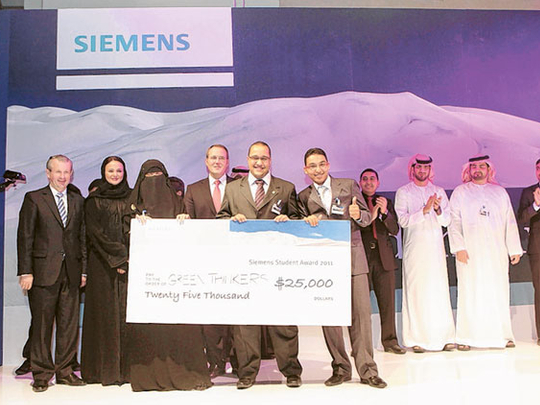
Doha: There are 550 million people living in cities in Asia and less than two per cent of them are able to breathe fresh and clean air. Additionally, experts predict that by the year 2025 one-third of the world's population will be affected by water shortages.
These humbling figures were relayed by Eric Kaiser, chief operating officer of Siemens Middle East, in Doha last week, during the inaugural Siemens Middle East Student competition.
"These figures are the reason why we asked students specifically in the Middle East for their ideas to tackle the challenging environmental questions of today and tomorrow," he said.
"The youth of today have grown up in a wide range of environmental questions and problems, air pollution, energy conservation and carbon footprint; it is up to all of us to join hands and provide our youth with the tools to combat those challenges."
The theme of the inaugural competition challenged young people to think of how to build sustainable cities in the desert.
Ten were selected from 630 to battle it out for the $25,000 (Dh91,827.50) first prize.
There were two UAE teams, from the Higher Colleges of Technology (HCT) and the American University of Sharjah (AUS). Neither won a prize, but they did land internships with Siemens, as did all the finalists.
Inspired by nature
The winning team, Green Thinkers from Egypt, took home the prize for their Spiral Power Plant, inspired by nature. The plant was modelled on the shape of a snail's shell, using glass as the main construction material to raise the temperature inside the plant, causing the hot air to rise and drive turbines.
Although Loay Al Mujadidi, who studies civil engineering at AUS, did not win for his hourglass generator idea, the 20-year-old received commercial business interest from Saudi Arabian investors.
"I am Saudi so it could be in my best interest to go and give back to my country and help grow the economy," he said.
"Not winning just gives me motivation. All the winners deserve it because they have great ideas."
His idea created energy using energy from the flow of sand.
"The sand will be put in a container at the top of the structure to flow down to the bottom," he said.
"In the middle there will be a propeller that will be rotated by the falling sand to generate energy."
Yousuf and Eisa Jaber Al Kuwaiti along with Abdullah Darwish Al Beloushi, mechanical engineering students at Al Ain Men's College, made the final with their idea of a one-man desert survival compartment.
"The idea is to build a self-dependent portable compartment run on solar panels during the day and battery reserves at night," said the team.
"The inspiration came from old mud houses in the UAE and the region which our old families used to live in."












